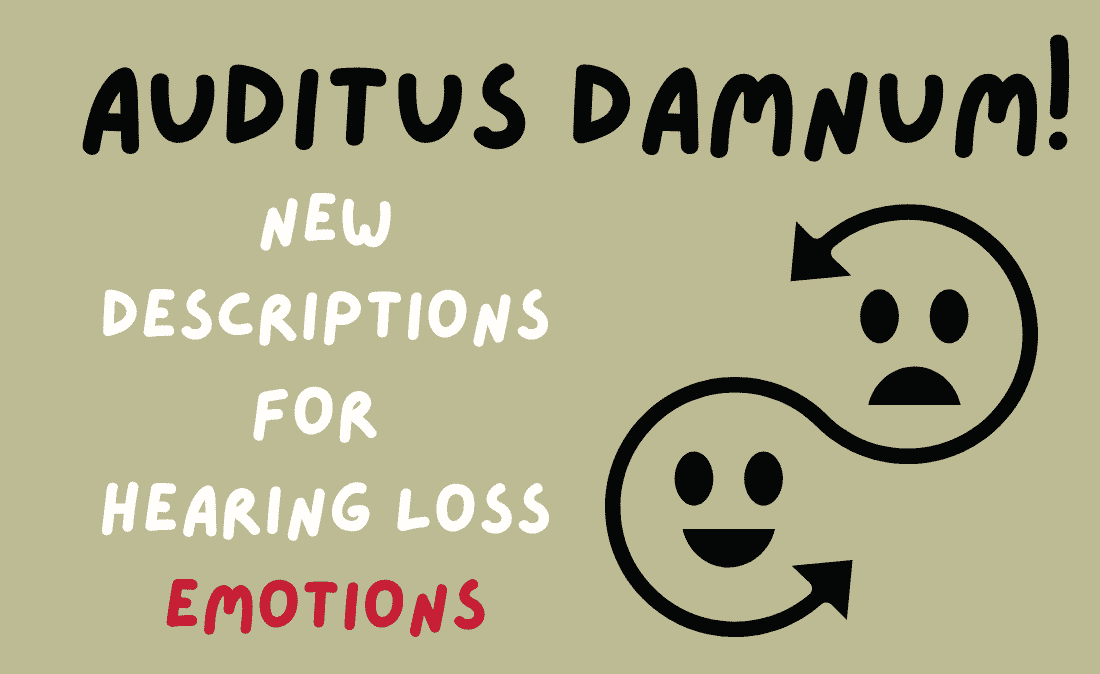Have you ever felt emotions about ‘something’, but you can’t find quite the right word to describe them? Often when we can’t find the right word for an emotion, it’s because it doesn’t exist!
I’ve been reading a fascinating book called The Dictionary of Obscure Sorrows by John Koenig, which is infinitely more enjoyable than the title suggests. It’s a dictionary of made-up words for emotions that we all feel but don’t have the words to express.
As I’ve been reading a few pages at a time, I’ve been thinking about the emotions that relate to our very human condition of hearing loss. I’ve come up with some (often-silly) descriptions of our response to common hearing loss situations.
Amplificitis: The painful, acute aggravation of being immersed in very loud noise. (From amplification and itis, the medical suffix meaning inflammation.)
Auditus damnum ridendi: Latin for – and this is not made up – to laugh at hearing loss. Hearing loss is not funny, but being able to laugh at our mishears helps us not to cry or feel shame. And who wouldn’t love saying this to someone: Please speak up, I have auditus damnum!
Dead-airing: When you realize that sounds have been made but you simply don’t hear them. It’s as if there is dead air between the source of sound and your ears. (The explanation is actually that you have hearing loss, but the effect is the same.) So, when someone asks you if you hear that bird, you can flip them off with, no, there’s too much dead air. Secretly, you would have liked to hear that bird and not be reminded once again that you can’t hear.
Keepupoopsie: The awkward embarrassment of making a comment only to discover that the conversation has moved on to a different subject. Oops, you didn’t keep up; accept the weird looks and move on.
Kubwa-Kubwa: The mortifying moment when someone motions that you’re speaking too loudly, either with their hand or with a face that looks as if it’s been hit by a spitball. From kubwa, Swahili for ‘loud’. The double-kubwa means you painfully realize you were louder than anyone else in the room or within a five-mile radius.
Fuggedaboutits: The feelings of worthlessness when you ask for a repeat and you’re told to never mind. Followed by your angry demand for the person to retract the demeaning statement and give the requested repeat. Otherwise, the relationship over, this moment, now. When you calm down, explain why never mind is not acceptable on any level.
Aha moment: The deep-soul satisfaction of having understood something without having it repeated three times. Hooray you! See also: aha moment in Dutch and Czech, aha momento in Esperanto, and moment aha in Albanian.
Audi-vaerst: The shocking realization that in the history of the universe, no one has EVER had hearing loss as bad as YOURS! From audire, Latin for hear and vaerst, Danish for worst. With effort, you come to realize that you may not have the world’s audibedst (self-explanatory), but you’re doing your best to move forward.
Mortmusical: When you realize that what you’re hearing is music (and not a toddler pounding on an accordian) but it sounds nothing like it used to, before hearing loss. In fact, even if someone tells you the name of the song, you still can’t make out the tune. From mort, Latin for death, and musical, English for musical.
Gottabeme: The liberating bliss of self-identifying with hearing loss for the first time – without shame. Pronounce it any way you want.
Presbycusis Projectile: The defensive reaction of pooh-poohing your family’s claims that you’re not hearing as well as you used to. They’re just trying to cover up their own mumbling and communication problems! From presbycusis, the medical term for age-related hearing loss and projectile, the kaka you throw at other people.
Gimmethelips: The needy, soul-stopping moment when someone turns their head away, eliminating your ability to speechread and understand. You desperately stretch your neck to get back into view or even, losing all pride, walk around to get in their line of sight once more.
Joie de chanson-visible: This is (my) French for the ‘joy of visual song’, the exquisite meaning we take from facial expressions and hand movements, reading lips, and interpreting body language. It’s the sigh of relief that helps when the hearing isn’t so good.
And finally….
THWIT: John Koenig coined this acronym for “The Hell Was I Thinking?”, but it’s a common human emotion of self-amazement, and not in a good way. In our hearing loss world, you may feel THWIT when you walk into the shower with your hearing devices on. I certainly felt THWIT when the dog ate my hearing aid lying on my bedside table. Every person with hearing loss has at least one major THWIT moment in their lives.
And then we move on, carrying our emotions as proof of our human-ness.








Hilarious
These are absolutely wonderful! I wish I could remember them all , thank you maybe there is a word for that ?
I love keepupoopsie the best. Just perfect
Thanks, Gael. I had a THWIT moment when I, wearing my Roger Pen on a string around my neck, picked up my things from a conference room table, including a glass of water into which my Roger Pen swung. Arrrrrgh.
Amazing and exact. Adding these to my vocab.
Thank you for helping me understand my problem.
Well done!
So kewl to have “words” to describe often felt emotions that I I feel every day with my hearing loss !